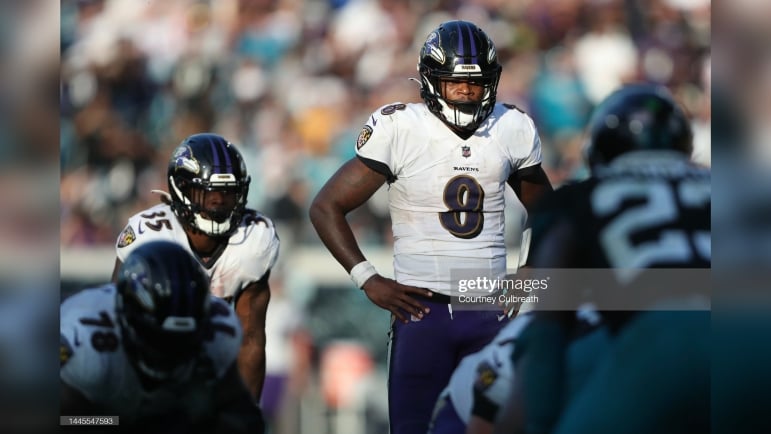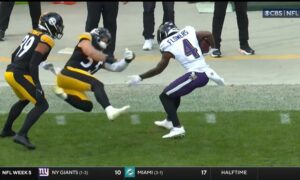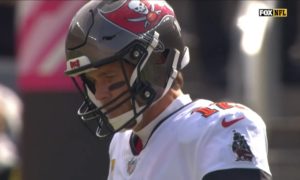Like it or not, the NFL’s franchise tag isn’t going away anytime soon. It may be here forever. But the NFLPA should fight tooth and nail to make it a singular avenue, the exclusive rights franchise tag and nothing else.
This is a fight that can’t and won’t take place until the next CBA negotiation. My ask is a patient one, the latest pact running through the 2030 season. But the union must get the tag modified. To do otherwise isn’t putting their top players in the NFLPA’s best interest.
It comes to light around Baltimore Ravens QB Lamar Jackson, slapped with the non-exclusive tag Tuesday. But his situation, on some levels, isn’t all that unique. The non-exclusive tags allows teams the ability to submit offer sheets and potentially sign the player away, giving up two first round picks in the process, and it also comes at less of a cost for the team applying the tag. The exclusive rights tag closes the chance for teams to submit offers but is also more expensive.
Under the non-exclusive tag, Jackson’s base salary would be $32.4 million. Had the Ravens used the exclusive tag, Jackson’s salary would’ve jumped well over $40 million. It’s doubtful that no matter the resolution, Jackson will actually play this year on the tag, but it’s possible, and there’s certainly a financial incentive, with no way to push that money into future years, for the team to go the non-exclusive route. Since 2012, the exclusive tag has only been used four times.
As former NFL agent Joel Corry puts it, the exclusive tag will always be more than the non-exclusive and generally, by a considerable amount.
“Under the exclusive franchise tag, a player will receive a one-year offer from his team that is the greater of the average of the current top five salaries (salary cap numbers with some minor adjustments) at his position once the restricted free agent signing period of the actual league year has ended (April 21 for 2023) or 120% of his prior year’s salary. The non-exclusive number is initially used as a placeholder and adjusted upwards if the exclusive calculation dictates once restricted free agency ends. In no circumstance will the exclusive franchise tag be less than the non-exclusive franchise tag.”
On paper, the non-exclusive tag is supposed to carry a player benefit. The chance to be a quasi-free agent, for teams to try to pry him away. And occasionally teams have submitted offers only to see the tagging team match. But movement here is rare. The last time a non-exclusive player tag changed teams with full compensation was WR Joey Galloway in 2000.
So players get paid less and essentially never end up leaving their team. Win-win for the team, lose-lose for the player. That must change.
In the union’s perfect world, they’d dump the franchise tag entirely. It’s the stick teams hold over players as a last resort to prevent them from hitting the open market. But convincing the owners to completely do away with the concept requires a miracle. Or at least a couple bottles of Scotch. The number of compromises the union would have to make for that to happen would be absurd and certainly not worth it.
But they can make a dent into the tag’s power and use. It’s a great way to spin the situation. They’re not asking the NFL to eliminate their precious and beloved franchise tag. They just want to make sure teams who want to use it really want to use it and players who are tagged against their will are well-compensated.
It’ll change the league’s calculation. Is that player really worth all that extra money? Maybe. For Jackson, he still would be. For other players, like RB Tony Pollard or TE Evan Engram, maybe not. In effect, fewer players would receive the tag, which would be a win for the players and the union that represents them.
Right now, there’s really only one tag that exists. The non-exclusive. So much so that Jackson aside, you rarely even hear the differentiation named. Jackson aside, when the tag was used on Pollard, Engram, and the others, the “non-exclusive” phrase wasn’t even invoked. It’s implied the franchise tag that’ll be used will be the non-exclusive variety and that the player will get paid less and that he will stay with the team that tagged him.
Under DeMaurice Smith, the union hasn’t represented its players well. And to be clear, the franchise tag applies to only the top 0.1% of players and it isn’t the largest issue facing its player base. But it is an issue and one that the union can win in the court of public opinion and over the NFL.
It’s going to be awhile before the union could make this push. Better late than never. And they’d do what the union is supposed to do. Fight for their players.








